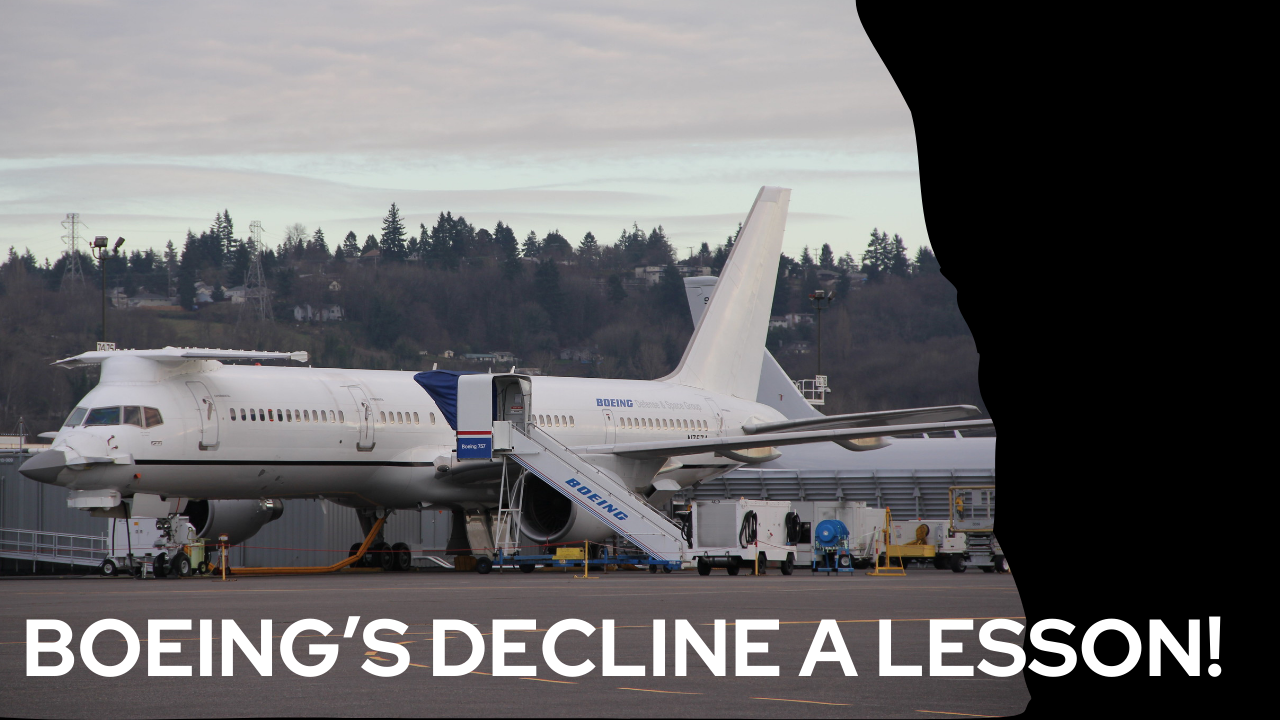Boeing, once the epitome of innovation and reliability in the aviation industry, has experienced a dramatic fall from grace. This downfall, rooted in critical business decisions and leadership shifts, offers crucial lessons for entrepreneurs and business leaders.
For decades, Boeing was a product-driven company, led by engineers who prioritized quality and safety over profits. This dedication led to groundbreaking achievements, such as the Boeing 747, which revolutionized air travel. However, the 1996 merger with McDonnell Douglas marked a pivotal shift. The new leadership, driven by MBA-style business strategies, prioritized cost-cutting and outsourcing over innovation. This change in philosophy resulted in compromised product quality, culminating in the tragic crashes of the Boeing 737 Max.
Boeing’s Decline a Lesson!
Product vs. Business-Driven Philosophy: Entrepreneurs must make a fundamental decision: should they focus on creating exceptional products, or should they prioritize maximizing profits? Historically, Boeing thrived as a product-driven company, led by engineers passionate about building the best aircraft, even at the expense of short-term profits. This approach led to innovations like the iconic Boeing 747, which dominated the skies for decades. However, Boeing’s shift to a business-driven philosophy, prioritizing cost-cutting and shareholder returns over product quality, proved catastrophic. The introduction of the 737 Max, a cost-effective update to an existing model, without sufficient pilot training or safety measures, resulted in two tragic crashes. This underscores the importance of maintaining a product-first approach to ensure long-term success and safety.
Importance of Organizational Culture: The culture within an organization plays a crucial role in its success. Boeing’s earlier success was rooted in a culture where engineers had significant authority and a commitment to safety and innovation. However, the acquisition of McDonnell Douglas brought a shift in leadership and culture. The new management prioritized cost-cutting and outsourcing, leading to a disconnect between the management and engineering teams. This disconnect resulted in compromised product quality and safety standards. For sustained success, it is essential to foster a collaborative culture where management and product teams work closely together, aligning their goals and maintaining a shared commitment to excellence.
Cost-Cutting vs. Compromise: While cost-cutting is a necessary strategy for growth, it must be done wisely. Boeing’s aggressive cost-cutting measures, including extensive outsourcing and layoffs, led to a loss of control over the production process and quality assurance. Moreover, the focus on share buybacks to boost stock prices diverted funds from crucial areas like R&D and safety improvements. This ultimately compromised the quality and safety of their products, leading to disastrous consequences. Entrepreneurs must balance cost-cutting with maintaining product integrity and safety. Compromising on these core values can lead to the erosion of trust and brand reputation, as seen in Boeing’s case.
Boeing’s story underscores the importance of maintaining a balance between business acumen and product integrity. By prioritizing short-term gains, the company compromised its long-standing reputation and market position. Entrepreneurs should heed these lessons to avoid similar pitfalls and build sustainable, innovative businesses.



3 thoughts on “Boeing’s Decline: A Cautionary Tale for Entrepreneurs”